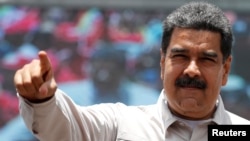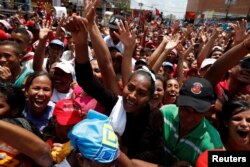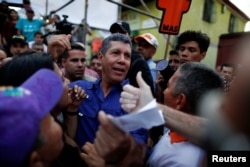Widely blamed for Venezuela's unprecedented economic crisis, President Nicolas Maduro vowed on Tuesday to make "great changes" in the OPEC nation reeling from hyperinflation and shortages if re-elected this weekend.
The 55-year-old leftist, however, gave no specifics about how he would turn around Venezuela's economy, mired in the fifth year of a grueling recession under his rule since 2013.
Despite pressure from political opponents and angst among millions of Venezuelans, Maduro has largely refused to make even minor reforms to the creaking state-led economy such as overhauling dysfunctional currency and price controls.
"Venezuela needs big economic changes and we are going to do it ourselves," Maduro said at a rally in the bedroom community of Charallave, south of Caracas, prior to Sunday's poll.
Though personally unpopular, Maduro is expected to win due to a boycott by the mainstream opposition, loyalists' control of key institutions, and the vote-winning power of state handouts.
"If you give me your power on May 20, I swear ... to you with my life that I will dedicate myself to making all the economic changes that Venezuela needs for rebirth," added Maduro, who danced and sang under the Caribbean sun.
Maduro's pledges ring hollow to many Venezuelans who blame him for salary-destroying hyperinflation, food shortages, the return of once-controlled diseases and mass emigration.
The president blames a U.S.-led "economic war", including recent sanctions on the financial sector by U.S. President Donald Trump's administration, for hardships.
Some observers expect him to take a harder line against companies after he is re-elected, likely exacerbating the crisis. Recent arrests of top executives at the country's main private bank, Banesco, and two employees at U.S. oil major Chevron, have spooked the business sector.
"With little appetite to unwind the existing forex framework or otherwise adjust to stem hyperinflation, the government has few policy options beyond intervention and scapegoating," said the Eurasia consultancy in a recent report.
Maduro's main rival in Sunday's vote, former state Governor Henri Falcon, is proposing dollarizing the economy, reversing botched nationalizations, and opening Venezuela to immediate emergency foreign aid.
"Which would you prefer to have - two petros or two dollars?" he asked a crowd in a poor Caracas neighborhood at a rally on Monday night. He was referring to a new cryptocurrency project, which Maduro has pitched as crucial to bypassing U.S. sanctions on the South American country.
"Dollars!" Falcon's supporters roared back.







